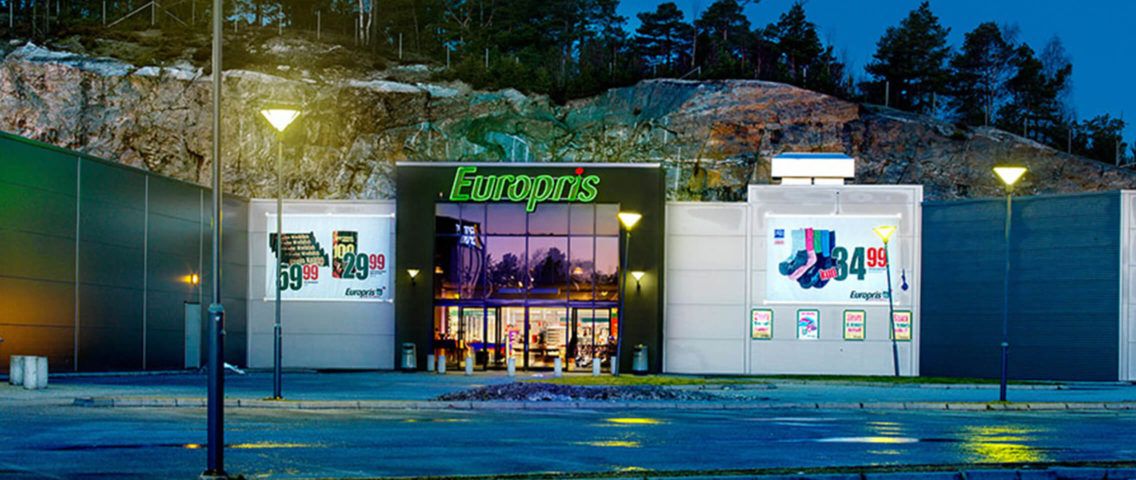Europris is Norway’s largest discount variety retailer. Its low-cost model relies on optimized sourcing, logistics and distribution. Europris offers competitively-priced private-label and brand-name merchandise across 12 product categories including home, DIY and gardening. In 2015 it decided to transform its supply chain operations in order to gain better visibility, free-up working capital and improve customer service.
Background
The Europris supply chain team had two particular areas of concern. Firstly, it appeared that some stores were carrying significantly more inventory than others. The SC team felt it would be possible to reduce inventory by 10-20% overall.
Secondly there seemed to be no obvious relationship between inventory and availability. Some stores with lower inventory levels had excellent availability, while a neighboring store might be carrying excess and yet still be out of stock across a range of items.
Europris concluded that the underlying problem was a lack of visibility. In particular its overview of what stock stores were actually holding was poor. It needed to be able to measure store service levels in an efficient and reliable way so it could plan and forecast effectively. For that, Europris turned to RELEX.
“Before we implemented RELEX, it was difficult for us to measure things like availability other than by going out to stores to take a look or by monitoring customer complaints”, says Marco Pair, Supply Chain Manager, Europris. “We were being told that our campaign items had sold out even though they were still being advertised. That sort of thing inevitably has an impact on customer loyalty.”
“Before we implemented RELEX, it was difficult for us to measure things like availability other than by going out to stores to take a look or by monitoring customer complaints.”
Marco Pair, Supply Chain Manager, Europris
Change Management
Before starting out to transform its supply chain replenishment, ordering was carried out in-store by local managers without the help of any data analysis or forecasting. Store managers spent up to three to four hours a week on reordering.
Having thoroughly reviewed its operations, Europris moved to centralize replenishment to make the most effective use of the automation and analytics offered by RELEX.
Europris began to develop a supply chain team consisting of planners taking the responsibility for the flow of goods throughout the supply chain – from the factory to the end customer. The RELEX system now produces highly accurate forecasts and suggests order quantities. Those order recommendations are then being sent to store managers for their review and approval.
The biggest challenge was not technical but rather to persuade colleagues that the new system benefitted everyone within the company.
Pair took super-user colleagues around Norway to meet store managers and to reassure them that their roles were changing, not being downgraded. They used e-learning and created a large assortment of training tools to accompany the project.
During the roll-out, attitudes reached a tipping point. “Store managers were starting to come to us and say ‘We don’t want to wait three months to implement the new system, is it possible to start now?’ I think that’s a quite remarkable level of interest in an IT project from stores.”
Having taken around three hours per store on re-ordering, store managers typically now spend just 30 minutes. Managers are already refocusing their time on customer care, building better displays and keeping floor plans up to date – resulting in increased customer loyalty and sales.
“Stores feel as though they have an extra employee handling ordering, and that employee is RELEX.”
Marco Pair, Supply Chain Manager, Europris
Innovation
The project highlighted the close collaboration between Europris and RELEX. RELEX’s experience and expertise allowed it to both share best practice and help develop innovative solutions to challenges. One such challenge involved setting presentation stock levels, a standard parameter in RELEX representing the minimum stock of each item in each store that must always be on display. Initially min fill levels had been determined centrally but the results of this one-size-fits-all approach were unsatisfactory.
So the joint RELEX/Europris team built a new “plug and play” tool using the RELEX platform. It uses data from Europris’s space planning system to calculate the minimum quantities needed to create credible displays. It does so for each individual planogram factoring in its shelving and layout and the different parameters specified in routine or promotional display proposals. RELEX then forecasts and automatically recommends quantities or suggests orders based on the stock needed to fill available space for any given item. “Store managers now receive order proposals based on RELEX’s recommendation without having to update thousands of parameters,” says Pair.
Results
The technical implementation went very smoothly with all the chain’s suppliers, its 230-plus stores and the DC all brought onto the system in a matter of months.
“From a technical point of view there were almost no obstacles. We’d sit in project meetings and ask ‘When is a bug going to show up?’ It never did. Did we ever wonder if we’d made the right choice? No. Never.” says Pair
Achieving a high level of supply chain visibility meant that Pair and his colleagues at last knew what stock was in the stores. Moreover, it opened the way to significantly more accurate replenishment forecasting and campaign management. Inventory levels fell sharply, availability rose dramatically and Europris’s ability to plan its logistics and staffing requirements improved markedly.
Pair foresees even more efficiency gains in the future. “We believe that we’ve only achieved 40% of what is possible so far. A fantastic roadmap lies ahead of us. The timeline over the next one or two years is full of things we can do thanks to RELEX.”
